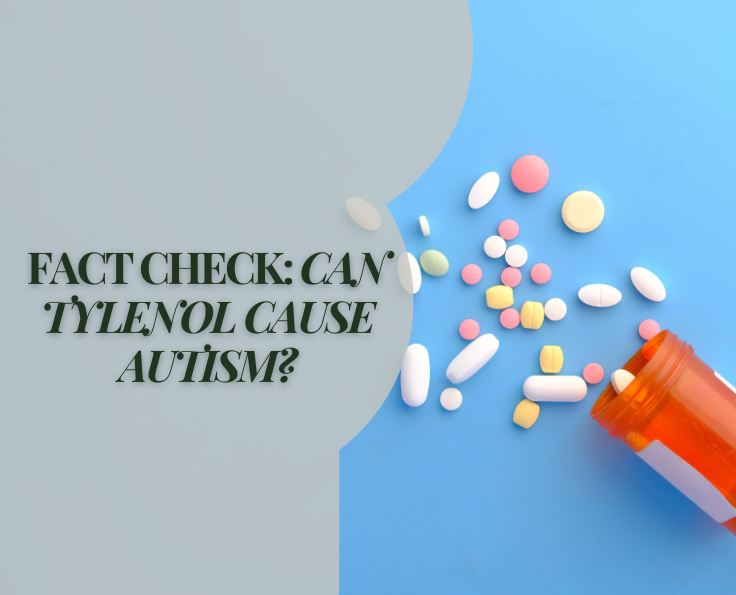Tylenol & Autism — A Deep Dive
Tylenol & Autism — What the Evidence Really Says
Several large observational studies have reported associations between prenatal or early-life acetaminophen exposure and higher rates of autism spectrum disorder (ASD) or ADHD in children.
Other analyses that control for family confounders (sibling comparisons) have not found a causal link, suggesting at least some previously reported associations may be due to shared family or genetic factors.
Biological mechanisms have been proposed - glutathione depletion / oxidative stress / mitochondrial effects - but these hypotheses are not proven to cause autism in humans at typical therapeutic doses.
What acetaminophen is and how it’s metabolized
Acetaminophen (paracetamol; Tylenol) is a widely used over-the-counter analgesic/antipyretic (fever reducer).
At normal doses it’s largely safe, but a small fraction is converted by liver enzymes to a reactive metabolite called N-acetyl-p-benzoquinoneimine (NAPQI).
Normally NAPQI is detoxified by glutathione (GSH). If glutathione stores are exhausted (e.g., in overdose), NAPQI accumulates and causes liver injury — a well-established, dose-dependent mechanism.
Laboratory and animal studies show acetaminophen can lower glutathione in cells and affect oxidative stress pathways in some cell types. Extrapolating those cellular effects to human fetal brain development or to long-term neurodevelopmental outcomes is plausible as a hypothesis, but not proven. However, simply because something is not yet ‘proven’ does not mean that it is nor real, or true. It just means ‘we don’t know yet’.
Epidemiologic studies — what they show (and their limits)
Multiple cohort studies over the past decade have reported that prenatal acetaminophen use is associated with a modestly increased risk of neurodevelopmental diagnoses (autism, ADHD) in children. Several meta-analyses flagged consistent associations across many observational studies.
Important caveats:
Observational studies can only show correlation, not causation. Pregnant people who take acetaminophen may differ in important ways (fever or infection, genetics, environmental exposures, health-seeking behavior) from those who do not.
Sibling-controlled analyses (which compare siblings for exposure) reduce confounding by shared family/genetic factors. A high-quality sibling analysis published in JAMA (2024) did not find an association between prenatal acetaminophen and later autism/ADHD when accounting for familial confounding — suggesting that some previously reported associations may be due to those confounders.
Recent reviews using rigorous evidence-grading have concluded the body of literature shows associations worthy of concern and further study, but they did not establish a definitive causal relationship. Regulatory agencies (including the FDA) are reviewing labeling and evidence in light of these mixed results.
Mechanistic theories: glutathione, oxidative stress, mitochondria
Researchers have proposed several biologically plausible ways that acetaminophen could affect neurodevelopment:
Glutathione depletion / oxidative stress: Acetaminophen metabolism can reduce glutathione in cells. In theory, lower glutathione (especially in developing fetal tissues with less antioxidant reserve) could increase vulnerability to oxidative injury. This mechanism is solid for overdose hepatotoxicity; whether therapeutic doses in pregnancy or infancy meaningfully deplete fetal brain glutathione is not established - “we don’t know yet”.
Mitochondrial dysfunction & inflammation: Some investigators hypothesize that acetaminophen (or its metabolites) could alter mitochondrial function or promote low-grade neuroinflammation, potentially affecting neurodevelopment. Evidence is preliminary and based on animal or in vitro studies; human verification is lacking.
Endocannabinoid system effects: Some older hypotheses suggested acetaminophen metabolites affect endocannabinoid signaling, which plays a role in neurodevelopment. Again, this remains theoretical.
Bottom Line
Scientists have come up with some possible ways that acetaminophen (Tylenol) might affect brain development — like lowering glutathione, an important antioxidant in the body. These ideas raise good questions and we need a lot more further research on this topic.
Fever, Infections & Vaccines — What We Know
Fever during pregnancy:
Research shows that when a pregnant woman has a high fever or infection (especially in the first or second trimester), the child may have a higher risk of developmental challenges later on. Scientists think this may be due to the body’s immune response — inflammation and chemical messengers called cytokines — rather than the fever itself. In serious cases, treating the fever or infection is important to protect both mom and baby, which is why it’s always best to talk with a trusted healthcare provider before skipping medication.
Fevers after vaccines:
It’s normal for babies and kids to get a mild fever after some vaccinations — it’s a sign that the immune system has been activated and is ramping up. Some parents worry that giving Tylenol for these fevers could play a role, but current research hasn’t proven any cause-and-effect chain like: vaccine → fever → Tylenol → autism. In other words, there’s no solid evidence yet that treating a post-vaccine fever with Tylenol leads to autism. However, in a baby, with an under-developed immune system, and with significantly lower levels of glutathione in their blood than adults, it’s plausible that a vaccine injection, followed by tylenol may cause unwanted effects in the body of that baby.
What Regulators Are Saying (2024–2025)
Big research groups and evidence reviews have noticed patterns that raise questions about frequent Tylenol use during pregnancy and child development. They’ve called for more studies to understand what’s really happening.
The U.S. FDA has even announced it is reviewing the evidence and may update product labels to mention these concerns. Importantly, this doesn’t mean Tylenol has been proven harmful — it’s more about transparency and caution while researchers learn more.
Practical, cautious takeaways (non-medical guidance)
Don’t panic. The evidence is mixed. Many families who used acetaminophen in pregnancy or childhood do not have children with autism. Observational associations don’t prove causation.
Discuss with your clinician. If you are pregnant or caring for infants, ask your OB/PCP about when to use acetaminophen, alternatives, and how to manage fever or pain safely. This is especially important if you have other risk factors or underlying conditions. Ask them questions about Tylenol and glutathione levels in yourself and your baby, about glutathione depletion, and about glutathione repletion.
Treat serious fever or infection promptly. Untreated high fever or severe infection during pregnancy carries its own risks. Don’t avoid treatment because of alarming headlines without talking to a provider. Another blog post on this coming soon!
Takeaway for readers: The science is still unfolding. Stay tuned for more blog posts on safer alternatives to Tylenol (acetaminophen) in Mom and baby.

